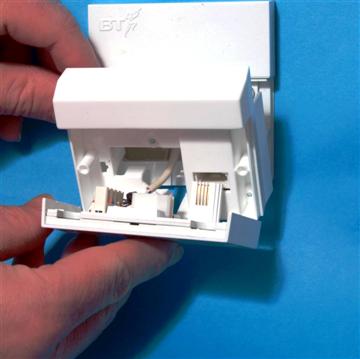Rubbish home broadband? BT has the answer...

(Clue: It's not an imminent fibre rollout)
BT may have been making a few noises about investing in a fibre broadband network for the UK - provided it can get a guaranteed return on investment - but it's still banking on getting the most out of Blighty's ageing household wiring first.
BT Wholesale will be offering its ISP customers a hardware filter that it says could potentially improve customers' broadband by filtering out electrical interference in the home caused by TVs, fluorescent lighting and home wiring.
Broadband from A-Z
Click here for all there is on broadband, from fibre to zombies.
The patent-pending gizmo is called the I-Plate and screws into a phone socket in the home. BT said trials of the tech have shown filtered lines can gain a variety of improvements including faster speeds and a more stable connection. In a benchmark survey of 36,000 lines it said filtered lines typically showed a speed hike of up to 1.5Mbps, with some showing improvements of as much as 4Mbps - although BT has warned higher speeds aren't guaranteed.
BT added the filter can also extend the geographical reach of a broadband service by around 10dB - claiming households that are some distance from an exchange could see an improved service, while others which were previously beyond the reach of a broadband service may now be able to get it.
Ian Fogg, research director at JupiterResearch, told silicon.com the move is "a tactical measure" by BT "to make the best of current broadband technology".
He said: "It should give some small improvements but it's very much BT trying to prolong the life of putting broadband over telephone lines. If BT was being more aggressive with rolling out optical fibre, which gives a big step change in broadband speeds, this announcement would be much less significant."
Fogg added that some ISPs already offer ways for customers to maximise broadband speeds - such as encouraging customers to plug their broadband modem into the master socket rather than into an extension socket, and providing a broadband router with the same chipset as equipment in the customer's local exchange which Fogg said can also give a slight speed improvement.
Users of the I-Plate will need to have a BT NTE5 master socket and extension wiring in their home. The telco estimates seven out of 10 UK homes have the affected master socket and home wiring - or some nine million households. It said broadband interference is caused by an antennae effect produced by the 'bell wire' - a third wire that runs alongside the pair of wires carrying the telephone and fat pipe signals - which BT says forms part of the extension telephone wiring that runs around most homes.
The more electrical equipment in a home, the more potential interference to the broadband line. The I-Plate works by isolating the bell wire and filtering out the interference. The device can easily be self-installed by customers, according to BT, and fits between the front and back plate of the master telephone socket (as pictured below).

Photo credit: BT
BT Wholesale will be offering the I-Plate to its ISP customers which it said may or may not choose to pass on the cost of buying the hardware to customers. Some ISPs may choose to make the gizmo available to customers for free, a spokeswoman for BT added.
A recent silicon.com reader poll found UK consumers are making do with broadband speeds of up to 8Mbps at home, while research earlier this year from price comparison website uSwitch suggests line speeds are still on average 50 per cent slower than the headline speeds advertised.